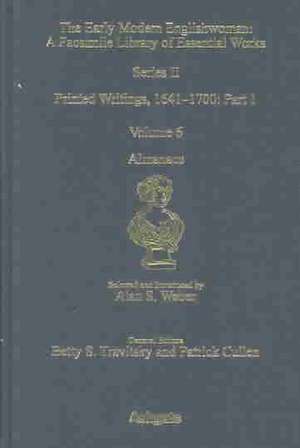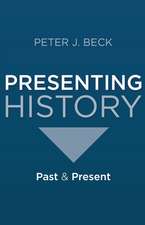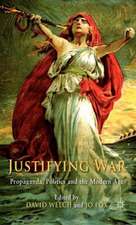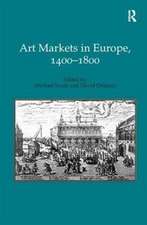Almanacs: Printed Writings 1641–1700: Series II, Part One, Volume 6: The Early Modern Englishwoman: A Facsimile Library of Essential Works & Printed Writings, 1641-1700: Series II, Part One
Autor Alan S. Weberen Limba Engleză Hardback – 7 mar 2003
Preț: 762.97 lei
Preț vechi: 1026.70 lei
-26% Nou
Puncte Express: 1144
Preț estimativ în valută:
145.99€ • 152.44$ • 120.56£
145.99€ • 152.44$ • 120.56£
Carte tipărită la comandă
Livrare economică 15-29 aprilie
Preluare comenzi: 021 569.72.76
Specificații
ISBN-13: 9780754602156
ISBN-10: 075460215X
Pagini: 320
Dimensiuni: 123 x 186 mm
Greutate: 0.39 kg
Ediția:1
Editura: Taylor & Francis
Colecția Routledge
Seria The Early Modern Englishwoman: A Facsimile Library of Essential Works & Printed Writings, 1641-1700: Series II, Part One
Locul publicării:Oxford, United Kingdom
ISBN-10: 075460215X
Pagini: 320
Dimensiuni: 123 x 186 mm
Greutate: 0.39 kg
Ediția:1
Editura: Taylor & Francis
Colecția Routledge
Seria The Early Modern Englishwoman: A Facsimile Library of Essential Works & Printed Writings, 1641-1700: Series II, Part One
Locul publicării:Oxford, United Kingdom
Cuprins
Contents: Introductory note; Sarah Jinner: An Almanack or prognostication for the year of our Lord 1658; An Almanack or prognostication for the year of our Lord 1659; An Almanack for the year of our Lord God 1664; Mary Holden: The womans almanack for the year of our Lord, 1688; The womans almanack: Or, an ephemerides for the year of our Lord, 1689; Dorothy Partridge (pseudonym?): A woman's almanack, for the year 1694; Appendix: Mother Shipton (pseudonym?): The prophesie of Mother Shipton... (1641); Shinkin ap Shone (pseudonym?): The honest Welch-Cobler; Shinkin ap Shone Her Prognostication for The ensuing Year, 1654; Sarah Ginnor (pseudonym?): The Womans Almanack: Or, Prognostication for ever; Appendix B: A key to difficult-to-read passages.
Notă biografică
Selected and Introduced by Alan S. Weber
Descriere
Almanacs were highly influential on popular opinion during the early modern period. They were the least expensive kinds of books and had a practical use as a calendar, literary miscellany, weather guide and advertising medium. The almanacs in this volume contribute to our understanding of women's participation in popular culture, astrology, medicine and prophecy. Sarah Jinner's almanacs for the years 1658, 1659 and 1664, and Mary Holden's almanacs for 1688 and 1689 show a conscious effort to distance themselves from other female religious prophets of the period by relying on the status of astrology as a rational science. The other works in the volume are all attributed to writers who were probably pseudonymous. Dorothy Partridge's The Woman's Almanack for the Year 1694 includes several short articles on chiromancy. The Prophesie of Mother Shipton concerns the prediction of the deaths of Cardinal Wolsey and Thomas Cromwell. The final works in the volume comprise two texts by Shinkin ap Shone which satirize the Welsh people and language, and The Woman's Alamanack by Sarah Ginnor which uses sexual humour to parody the medical advice offered in Jinner's almanacs.


















